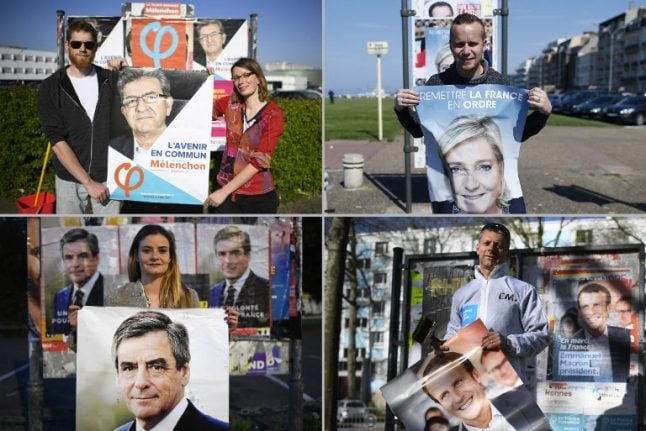Polling stations opened at 8:00 am (0600 GMT) and the last will close in major cities at 8:00 pm (1800 GMT) with estimated results expected soon afterwards.
Hundreds of thousands of French expatriates in the US, Canada and South America already cast their ballots on Saturday.
Far-right leader Marine Le Pen and centrist Emmanuel Macron are the frontrunners to progress to a run-off on May 7 but the result is too close to call in a deeply divided country.
Le Pen, the 48-year-old leader of the National Front (FN), hopes to capitalise on security jitters that were catapulted to the fore of the campaign after the fatal shooting of a policeman on Paris's Champs Ulysses avenue claimed by the Islamic State group.
Aiming to ride a wave of populism that led Donald Trump to the White House and Britain to vote for Brexit, Le Pen also wants to pull France out of the eurozone and has threatened to take the country out of the EU as well.
Her ambitions have led observers to predict that a Le Pen victory could be a fatal blow for the EU, already weakened by Britain's vote to leave the bloc.
Macron, only 39, is seeking to become France's youngest ever president and has campaigned on a strongly pro-EU and pro-business platform.
Seeking to benefit from a worldwide move away from established political parties, the former banker formed his own movement “En Marche” (“On the move”) that he says is “neither to the left nor to the right.”
But polls show scandal-tainted conservative candidate Francois Fillon, a former prime minister, and hard-left firebrand Jean-Luc Melenchon are also in with a fighting chance of finishing among the top two candidates and reaching the all-important second round.
“Whoever the candidate is who is elected president of the Republic, it will be momentous,” Edouard Lecerf from polling institute Kantar Public told The Local.
“If it's Marine Le Pen, it's completely incredible. If it's Emmanuel Macron, who's only been in politics for two years, it's incredible. If it's François Fillon after everything that has happened, then it's also an incredible result.”
'They're all disappointing'
In the wake of the policeman's killing on Thursday, 50,000 police and 7,000 soldiers will be deployed around France to protect voters.
Analysts believe the attack so late in the campaign could shift the focus from the economy to security and hand an advantage to candidates seen as taking a hard line on the issue.
“If it were to benefit someone, that would clearly be Marine Le Pen who has dominated this issue throughout the campaign, or Francois Fillon,” said Adelaide Zulfikarpasic of the BVA polling institute.
In the aftermath of the attack, Le Pen called for France to “immediately” take back control of its borders from the EU and deport all foreigners on a terror watchlist.
US President Trump tweeted that the shooting “will have a big effect” on the election.
Closely watched around the world, the French campaign has been a rollercoaster ride of unpredictable twists and turns.
A race that began with the surprise nomination of Fillon as right-wingcandidate in November shifted into a higher gear in December when unpopular Socialist President Francois Hollande decided not to seek re-election.
Hollande's five years in office have been dogged by a sluggish economy and a string of terror attacks that have cost more than 230 lives since 2015.
Fillon was the early frontrunner until his support waned after he was charged following accusations he gave his British-born wife a fictional job as his parliamentary assistant for which she was paid nearly 700,000 euros ($750,000) of public money.
Though there are four main contenders in the election, a total of 11 candidates are taking part, most in single digits.
The candidate for the governing Socialists, Benoit Hamon, was a distant fifth going into the final weekend.
In such a close-fought race, the quarter of French voters still undecided could play a crucial role in the outcome.
Speaking to The Local on the eve of the election Khadija Hamoneau, a 27-year-old, bank employee, one of the millions of undecided summed up the problem facing many wavering French voters.
“At the moment, no candidate has convinced me,” she told The Local.
“It is the most complicated election I've ever experienced. I can't vote for Fillon: he's a crook. I can't vote for Le Pen: she's a xenophobe, she's worse than her father because she actually has a chance to win,” she said.
“Macron has Presidential charisma but encompasses the right and the left, and seems to despise the working class.
“Hamon's program is blurry, people from his own party desert him.
“As for Mélenchon, it's out of question, he's a non-racist version of Le Pen.”




 Please whitelist us to continue reading.
Please whitelist us to continue reading.
Member comments